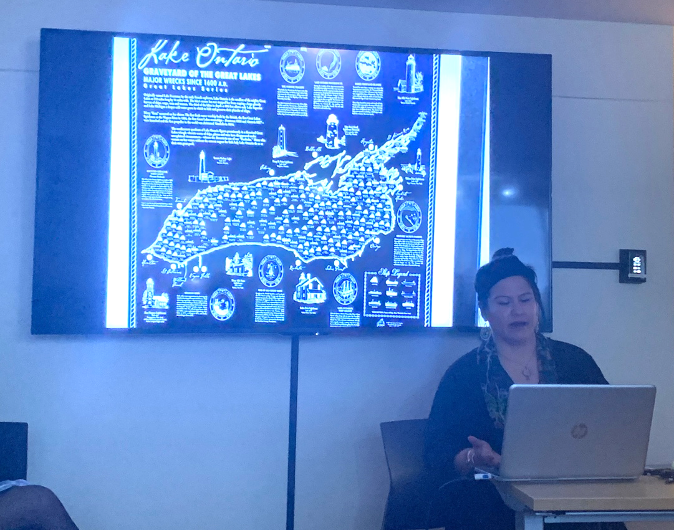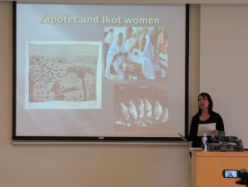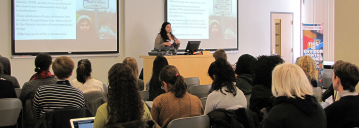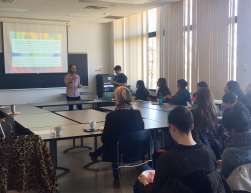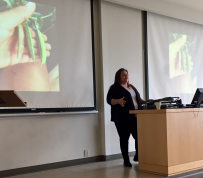Speaker Series 2019/2020 in collaboration with WaterAllies
“All Our Relations” took place as a winter a talk series sharing stories and insights about water and de-colonial water governance from the perspectives of Indigenous community based research and other water beings at the University of Toronto, St. George Campus. These events are co-sponsored by The Indigenous Environmental Justice Project (York University) and Great Lakes WaterWorks/Water Allies (New College/University of Toronto). All events were thoroughly promoted through the Water Allies and Indigenous Environmental Justice Project’s list serves and brought together different people interested in learning and discussing topics surrounding community based research and Indigenous water justice.
Eels and Other Swimmers Teaching Us Life
This series began in January 2020 with Kristi Leora Gansworth, an Anishinaabe poet and geographer and a citizen of Kitigan Zibi Anishinaabeg. She has ancestry belonging to the Onkwehonwe Haudenosaunee. Her presentation focused on research related to current and historic relationships between humans and eels. Currently, Leora is a PhD candidate in the department of geography at York University. Leora Gansworth’s presentation highlighted the human relationship to the eel and certain responsibilities to try to revitalize their place in the role of eels more broadly. Leora’s clan is eel (Pimisee) and the word is a dialect of Anishnabek language, literally translating to down the river. Many eels are dammed in the Ottawa River and a lot of them are shrouded in the turbines, evoking disputes with a contingent of people who think that dam should be removed. This issue stimulated a lot of discussion at the event, since there are so many other ways to get electricity today. Many things are unknown about eels and are difficult to track because of the dams because the either get destroyed along the way or get lost track of. Leora mentioned that there is a strong desire to use dams but thinks it would be wiser to work beyond that because it is better for long term survival for the species.
Belonging to the Lake: Unsettling Fisheries and Restoring Relationships at Nipissing First Nation
On February 6th 2020, Nicole Latulippe, a PhD in geography from the University of Toronto was raised in Nipissing Territory and is from Robinson Huron Treaty Territory in North Bay, Ontario. She presented “Belonging to the Lake: Unsettling Fisheries and Restoring Relations at Nipissing First Nation". At this talk, she discussed community-based research with Nipissing First Nation and the responsibilities supporting community members’ sovereign fishing practices, focusing on ways the community has managed to maintain relations with Lake Nipissing despite government criticism and interference. During the time of her research there was on going strong controversy with traditional fishing practices due to policy changes effecting Indigenous fisherman and local economies. Nipissing First Nation has taken a stand with these challenges by strengthening their own sovereign and traditional fishing practices. The community implements moratoriums once a year on fishing, to regulate more spawning and sustainable practices. Nicole’s work continues to develop over time and she considers writing a book conveying her findings and research.
Speaker Series 2018/2019 in collaboration with WaterAllies
The winter event series “Stories and Sovereignty: Winter Tales of Water and Love”, was held from January to March 2019. In this event series, we drew stories as a way of thinking forward on questions of water and water governance, love and sovereignty. In Anishinaabek teachings, winter has traditionally been, and remains, a time for story-telling, reflection, restoration, and envisioning, towards the moment when the sap (sugar water) flows, and the ice breaks in the spring. Co-sponsored by the Indigenous Environmental Justice Project with Dr. Deborah McGregor (Osgoode Hall, York University), and the Great Lakes Water Works/Water Allies project: a de-colonial research hub within the University of Toronto geared toward researching and teaching about water and water issues within the Great Lakes community, directed by Dr. Bonnie McElhinny (Department of Anthropology and Women and Gender Studies). The goal of this series was to contribute to conversations around water governance, gain exposure to a greater audience by creating knowledge mobilization, support further research on water and Indigenous perspectives and develop resources in relation to water and Indigenous legal traditions and knowledge.
Nibi Onje Biimaadiiziiwin: Water is Life
Nibi Onje Biimaadiiziiwin: Water is Life brought together three esteemed Indigenous scholars on January 15, 2019 for a panel on their stories, experiences and research, while fostering dialogue on Indigenous water law and concerns facing our waters and Indigenous communities today. We welcome Sue Chiblow of Garden River First Nation, a PhD student at York University’s Environmental Studies program, examining humanity’s relationship with water, Aimee Craft (Anishinaabe-Métis) who is assistant professor at the Faculty of Common law at the University of Ottawa, specializing in Anishinaabe and Canadian Aboriginal law and Deborah McGregor, a cross-appointed professor at York University from Osgoode Hall and the Faculty of Environmental Studies, whose research focuses on Indigenous knowledge systems and their various applications toward water, environmental governance and environmental justice. Together these scholars aim to create conversations to support further knowledge and research on water and Indigenous legal traditions.
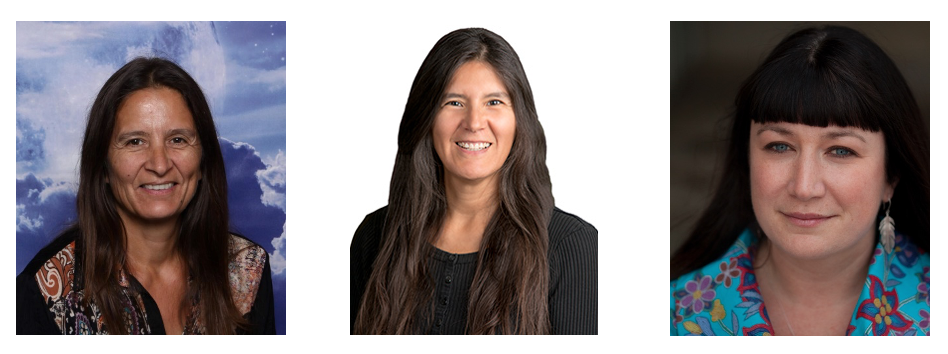
Left to Right: Sue Chiblow, Deborah McGregor, Aimée Craft.
Walking for the Water
On March 7, 2019, Kelsey Leonard (Shinnecock First Nation), scholar in water policy from McMaster University and water protector, gave a compelling presentation titled “Walking for the Water” at the faculty of Environmental Studies at York University. Her presentation discussed her research and experience with water walkers and how they have created awareness of the importance of water globally. Kelsey advocates for Indigenous approaches for taking care of water.
Kelsey mentioned that Indigenous people have a kinship to water, they are not protestors or terrorists, they just want access to clean water to live and lead healthy lives and communities. Kelsey also said that “we need to be more like water…learn to forgive, adapt and not be so greedy…and that as people, we need to come to terms with the way water and colonialism’s ongoing legacy has fragmented relations with the natural world and territories”. Though Grandmother Josephine has passed, her work and vision will continue to make progress toward a shared path and future where water is protected. Kelsey reminds us that water issues are not just Indigenous issues and that it is important think about how we honour the earth and the relationship we have toward water and other non-human entities every day, not just earth day! She references International Water Advocate, Autumn Peltier who says “it is time to warrior up!” implicating that everyone has a role to fulfill in a little or big way, in regards to respecting and allowing water to fulfill its responsibilities. We do this by using our voices to speak for the water, participating in advocacy initiatives and by valuing Indigenous knowledge and epistemologies in working towards giving rights to water.
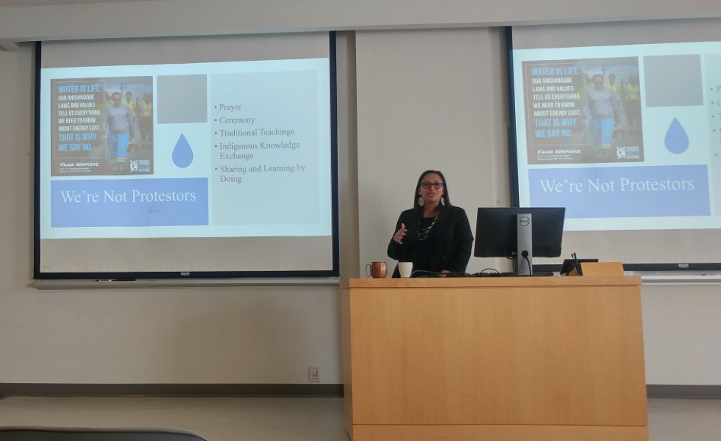
With generous support from York’s Faculty of Environmental Studies (FES), the Indigenous Environmental Justice (IEJ) project hosted a five-part speaker series during the 2016/2017 academic year. The series, which sought to highlight Indigenous women and youth perspectives on environmental justice, was well attended by community members, local high school students, and York faculty and students. In keeping with place-based objectives of Indigenous protocols, four of the five invited speakers hailed from the Great Lakes region in Southern Ontario.
In the spirit of social justice, four of the five events were live streamed via the IEJ project’s social media (Facebook and Twitter) channels to ensure that those who were interested but unable to travel for various reasons (financial, time, etc.) could participate. Further, all five presentations were recorded and transcribed. Please find the videos accessible through the IEJ project's website here.
The 2016/2017 Speaker Series was made possible through support from the following: Faculty of Environmental Studies; Osgoode Hall Law School; Centre for Research on Latin America and the Caribbean (CERLAC); Robarts Centre for Canadian Studies; Faculty of Geography; Faculty of Political Science; York Graduate Studies; Accessibility, Community, Equity (ACE) @ YorkU; Aboriginal Students’ Association at York (ASAY); Centre for Aboriginal Student Services (CASS); and the York University students that contributed time and energy to make this speaker series a success - Meagan Dellavilla, Nasreen Husain, Monica Shafik, David Bazargan, Yumiko Kiuchi, and the rest of the IEJ project team.
Chi Miigwetch to our gracious supporters and attendees!
Summary of the 2016/2017 Speaker Series
“The sea is our bread”: Interrupting Green Neoliberalism in Mexico
The series began in November 2016, with a presentation from Zapotec, feminist scholar and University of Alberta Professor, Isabel Altamirano-Jimenez. Dr. Altamirano-Jimenez shared stirring information on the ways an alleged “sustainable” development initiative has challenged Indigenous rights and sovereignty in the Tehuantepec Isthmus in Oaxaca, Mexico. Further, she discussed the community-led strategies guided by Zapotec conceptions of “communalism”, or “The Good Life”, that have been employed to counter the state-supported green initiatives.
Great Lakes Canoe Journey - Mobilizing Indigenous Knowledge and First Nations Communities by Birch Bark Canoes
Researcher, community advocate, and founder of the Great Lakes Canoe Journey, Sylvia Plain (Aamjiwnaang First Nation), opened the 2017 year with an uplifting talk on building capacity in Indigenous communities through revitalization of the canoe culture. As she explained, “this is not just about paddling”, canoe trips signify the relationship between people and their waterways. Since the inception of the program, Plain has created four new birch bark canoe builders and taught over 2,000 elementary and university students.
Environmental Racism in Canada's Chemical Valley
Twenty-four year old Anishinaabe youth activist, Vanessa Gray, joined us in February to raise awareness about the environmental and public health damage the petrochemical industry has been perpetrating against her 2 community - Aamjiwnaang First Nation - and communities across Canada.
Violence on the Land, Violence on our Bodies: Supporting Indigenous Feminist Land/Body Defenders
Two members of the Native Youth Sexual Health Network (NYSHN), Shane Camastro and Lindsay (Beze) Gray, shared information from NYSHN’s recently released report and toolkit, ‘Violence on the Land, Violence on our Bodies,’ which was created to help Indigenous communities resist environmental violence caused by industry. The toolkit, which centers the experiences and resistance efforts of Indigenous women and young people, offers communities resources to expose and curtail the impacts of extractive industries on their peoples and lands.
Longhouse to Greenhouse: An Emerging Food System at Six Nations
Adrianne Lickers, coordinator of the Our Sustenance program, rounded out this year’s speaker series with a presentation on the emerging food system and farmers’ market at Six Nations. As Lickers explained, “I know there’s that old adage, teach a man to fish… but we can do the same thing with tomatoes!” The Our Sustenance program strives to revive culturally-relevant food practices while helping to build confidence in the idea that we are all capable of growing our own food.

